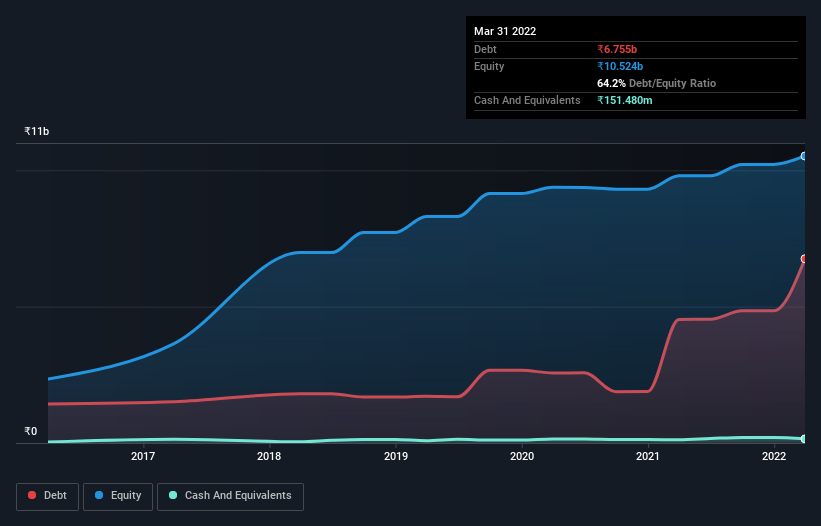
The external fund manager backed by Berkshire Hathaway's Charlie Munger, Li Lu, makes no bones about it when he says 'The biggest investment risk is not the volatility of prices, but whether you will suffer a permanent loss of capital.' When we think about how risky a company is, we always like to look at its use of debt, since debt overload can lead to ruin. Importantly, Bodal Chemicals Limited (NSE:BODALCHEM) does carry debt. But is this debt a concern to shareholders?
When Is Debt A Problem?
Debt is a tool to help businesses grow, but if a business is incapable of paying off its lenders, then it exists at their mercy. If things get really bad, the lenders can take control of the business. While that is not too common, we often do see indebted companies permanently diluting shareholders because lenders force them to raise capital at a distressed price. Of course, plenty of companies use debt to fund growth, without any negative consequences. When we think about a company's use of debt, we first look at cash and debt together.
Check out our latest analysis for Bodal Chemicals
What Is Bodal Chemicals's Net Debt?
As you can see below, at the end of March 2022, Bodal Chemicals had ₹6.75b of debt, up from ₹4.53b a year ago. Click the image for more detail. However, it does have ₹151.5m in cash offsetting this, leading to net debt of about ₹6.60b.

How Healthy Is Bodal Chemicals' Balance Sheet?
The latest balance sheet data shows that Bodal Chemicals had liabilities of ₹8.04b due within a year, and liabilities of ₹2.66b falling due after that. On the other hand, it had cash of ₹151.5m and ₹5.95b worth of receivables due within a year. So its liabilities outweigh the sum of its cash and (near-term) receivables by ₹4.59b.
Bodal Chemicals has a market capitalization of ₹11.7b, so it could very likely raise cash to ameliorate its balance sheet, if the need arose. But it's clear that we should definitely closely examine whether it can manage its debt without dilution.
In order to size up a company's debt relative to its earnings, we calculate its net debt divided by its earnings before interest, tax, depreciation, and amortization (EBITDA) and its earnings before interest and tax (EBIT) divided by its interest expense (its interest cover). Thus we consider debt relative to earnings both with and without depreciation and amortization expenses.
Bodal Chemicals's debt is 3.0 times its EBITDA, and its EBIT cover its interest expense 5.9 times over. This suggests that while the debt levels are significant, we'd stop short of calling them problematic. Notably, Bodal Chemicals's EBIT launched higher than Elon Musk, gaining a whopping 123% on last year. When analysing debt levels, the balance sheet is the obvious place to start. But it is Bodal Chemicals's earnings that will influence how the balance sheet holds up in the future. So when considering debt, it's definitely worth looking at the earnings trend. Click here for an interactive snapshot.
But our final consideration is also important, because a company cannot pay debt with paper profits; it needs cold hard cash. So the logical step is to look at the proportion of that EBIT that is matched by actual free cash flow. During the last three years, Bodal Chemicals burned a lot of cash. While that may be a result of expenditure for growth, it does make the debt far more risky.
Our View
Neither Bodal Chemicals's ability to convert EBIT to free cash flow nor its net debt to EBITDA gave us confidence in its ability to take on more debt. But its EBIT growth rate tells a very different story, and suggests some resilience. We think that Bodal Chemicals's debt does make it a bit risky, after considering the aforementioned data points together. Not all risk is bad, as it can boost share price returns if it pays off, but this debt risk is worth keeping in mind. There's no doubt that we learn most about debt from the balance sheet. But ultimately, every company can contain risks that exist outside of the balance sheet. We've identified 3 warning signs with Bodal Chemicals (at least 2 which are potentially serious) , and understanding them should be part of your investment process.
Of course, if you're the type of investor who prefers buying stocks without the burden of debt, then don't hesitate to discover our exclusive list of net cash growth stocks, today.
Valuation is complex, but we're here to simplify it.
Discover if Bodal Chemicals might be undervalued or overvalued with our detailed analysis, featuring fair value estimates, potential risks, dividends, insider trades, and its financial condition.
Access Free AnalysisHave feedback on this article? Concerned about the content? Get in touch with us directly. Alternatively, email editorial-team (at) simplywallst.com.
This article by Simply Wall St is general in nature. We provide commentary based on historical data and analyst forecasts only using an unbiased methodology and our articles are not intended to be financial advice. It does not constitute a recommendation to buy or sell any stock, and does not take account of your objectives, or your financial situation. We aim to bring you long-term focused analysis driven by fundamental data. Note that our analysis may not factor in the latest price-sensitive company announcements or qualitative material. Simply Wall St has no position in any stocks mentioned.
About NSEI:BODALCHEM
Bodal Chemicals
Engages in the manufacture and sale of dyestuffs, dyes intermediates, and other chemicals in India.
Undervalued with reasonable growth potential.


